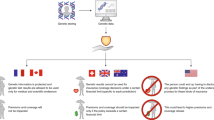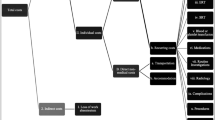Abstract
Gaucher disease is a rare, chronic,ethnic-specific genetic disorder affecting Jewsof Eastern European descent. It is extremelyexpensive to treat and presents difficultdilemmas for officials and patients in Israelwhere many patients live. First, high-cost,high-benefit, but low volume treatment forGaucher creates severe allocation dilemmas forpolicy makers. Allocation policies driven bycost effectiveness, age, opportunity or needmake it difficult to justify funding. Processoriented decision making based on terms of faircooperation or decisions invoking the ``rule ofrescue'' risk discriminating against minoritieswho may already suffer from inequitabledistribution of heath care resources. Apartfrom cost, Gaucher disease prompts questionsabout abortion. Unlike severe geneticdisorders, Gaucher offers no grounds forabortion and, in many ways, is analogous togender based abortions that are prohibitedregardless of fetal age. Finally, Gaucherraises concerns about the disclosure of geneticinformation. These affect potential carriersasked to participate in population studies andcarriers and patients who must considerdisclosure to others. These concerns weigh theright to privacy against communal interests andbilateral commitments.
Similar content being viewed by others
REFERENCES
Beutler E. The cost of treating Gaucher disease. Nature Medicine 1996; 2(5): 522–524.
Charrow J et al. The Gaucher registry: Demographics and disease characteristics of 1698 patients with Gaucher disease. Archives of Internal Medicine 2000; 160(18): 2835–2843.
NIH Technology Panel on Gaucher Disease. Gaucher Disease: current issues in diagnosis and treatment. JAMA 1996; 275(7): 548–553.
Daniels N, Sabin J. Limits to health care: Fair procedure, democratic deliberation, and the legitimacy problem for insurers. Philosophy and Public Affairs 1997; 26(4): 303–350.
Holm S. Goodbye to the simple solutions: The second phase of priority setting in health care. BMJ 1998; 317: 1000–1002.
Caplan A. Ethics, cost-containment, and the allocation of scarce resources. In Caplan A, ed. If I Were a Rich Man Could I Buy a Pancreas and Other Essays on the Ethics of Health Care. Bloomington: Indiana, 1992, pp. 315–335.
Emanuel EJ. The Ends of Human Life:Medical Ethics in a Liberal Polity. Cambridge: Harvard University Press.
Daniels N. Just Health Care. Cambridge: Cambridge University Press, 1985.
Clarke JTR, Amato D, Deber RB. Managing public payment for high-cost, high-benefit treatment: enzyme replacement therapy for Gaucher's disease in Ontario. CMAJ 2001;165(5): 595–596.
Arno PS, Bonuck K, Davis M. Rare diseases, drug development and aids: the impact of the orphan drug act. The Milbank Quarterly 1995; 73(2): 231–252.
Beutler E. Treatment regimens in Gaucher's disease. Lancet 1995; 346 (8974): 581.
Zimran A et al. Replacement therapy with imiglucerase for type 1 Gaucher's disease. Lancet 1995; 345(8963): 1479–1480.
Hope T. Rationing and life saving treatments: Should identifiable patients have higher priority? Journal of Medical Ethics 2001; 27(3): 179–185.
Gross ML. Autonomy and paternalism in communitarian society: The case of patient rights in Israel. Hastings Center Report 1999; 29(4): 13–20.
Diamond JM. Jewish lysosomes. Nature 1994; 368: 291–292.
Blank RH. The allocation and rationing of medicine. In Blank RH, ed. Rationing Medicine. New York: Columbia University Press, 1988, pp. 77–134.
Bayer R, Callahan D, Caplan AL, Jennings B. Toward justice in health care. American_Journal of Public Health 1988; 78(5): 583–588.
Wall A. ed. Health Care Systems in Liberal Democracies. London: Routledge, 1996.
Wagstaff A, van Doorslaer E. Equity in the delivery of health care: Some international comparisons. Journal of Health Economics 1992; 11: 389–411.
Tuohy CH. Principles and power in the health care arena: Reflections on the Canadian experience. Health Matrix: Journal of Law-Medicine 1994; 4(2): 205–241.
Central Bureau of Statistics. Health and Health Care Resources in Israel 1990–1995. Jerusalem: Central Bureau of Statistics, 1998.
Farfel M, Rosen B, Berg A, Gross R. Arabs’ and Jews’ Perceptions and Use of the Health System Following Implementation of the National Insurance Law: Findings from a Survey of the General Population. Jerusalem: The JDC Brookdale Institute of Gerontology and Human Development, 1997.
Gross ML. After feticide: Coping with late-term abortion in Israel, Western Europe and the United States. Cambridge Quarterly of Health Care Ethics 1999; 8(4): 449–462.
Takala T, Gylling HA. Who should know about our genetic makeup and why? Journal of Medical Ethics 2000; 26(3): 171–174.
Chadwick R. The philosophy of the right to know and the right not to know. In: Chadwick R, Levitt M, Shickle D, eds. The Right to Know and the Right Not to Know. Aldershot: Avebury, 1997, pp. 13–22.
Rhodes R. Genetic links, family ties and social bonds: rights and responsibilities in the face of genetic knowledge. Journal of Medicine and Philosophy 1998; 23(1): 10–30.
Veatch RM. Case Studies In Medical Ethics. Cambridge: Harvard, 1977.
Clarke AJ. Challenges to genetic Privacy: The control of personal genetic information. In Harper PS, Clarke AJ, eds. Genetics, Society and Clinical Practice. Oxford: Bios, 1997, pp. 149–164.
Thamer M, Brennan N, Semansky R. A cross-national comparison of orphan drug policies: Implications of the US orphan drug act. Journal of Health Politics, Policy and Law 1998; 23(2): 265–290.
Cox T et al. Novel oral treatment of Gaucher disease with N-butyldeoxynojirimycn (OGT 918) to decrease disease biosynthesis. Lancet 2000; 355(9214): 1481–1485.
Olson M. The Logic of Collective Action: Public Goods and the Theory of Groups. Cambridge: Harvard, 1965.
Author information
Authors and Affiliations
Rights and permissions
About this article
Cite this article
Gross, M.L. Ethics, Policy, and Rare Genetic Disorders: The Case of Gaucher Disease in Israel. Theor Med Bioeth 23, 151–170 (2002). https://doi.org/10.1023/A:1020324332620
Issue Date:
DOI: https://doi.org/10.1023/A:1020324332620




